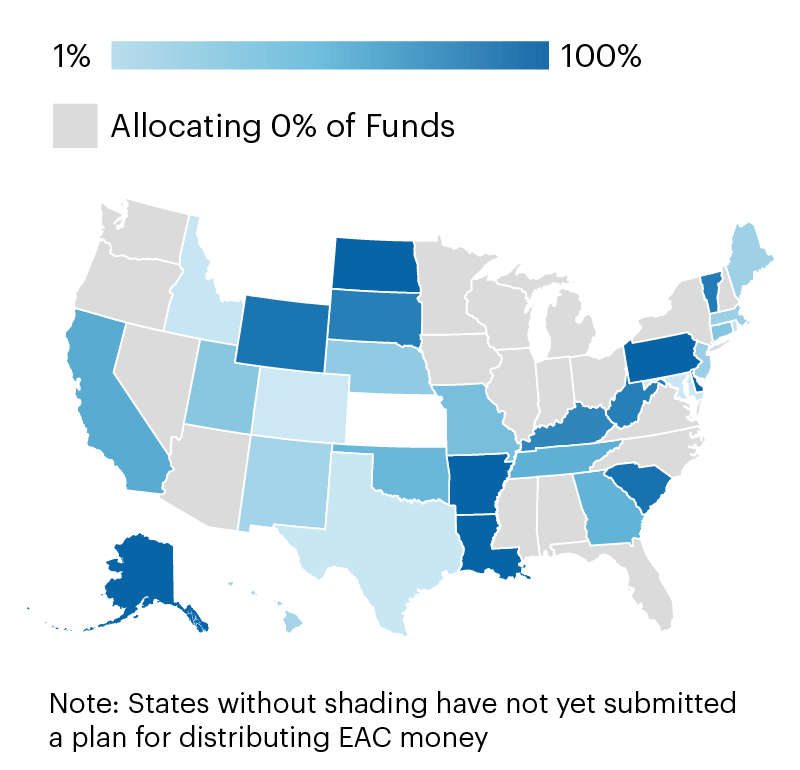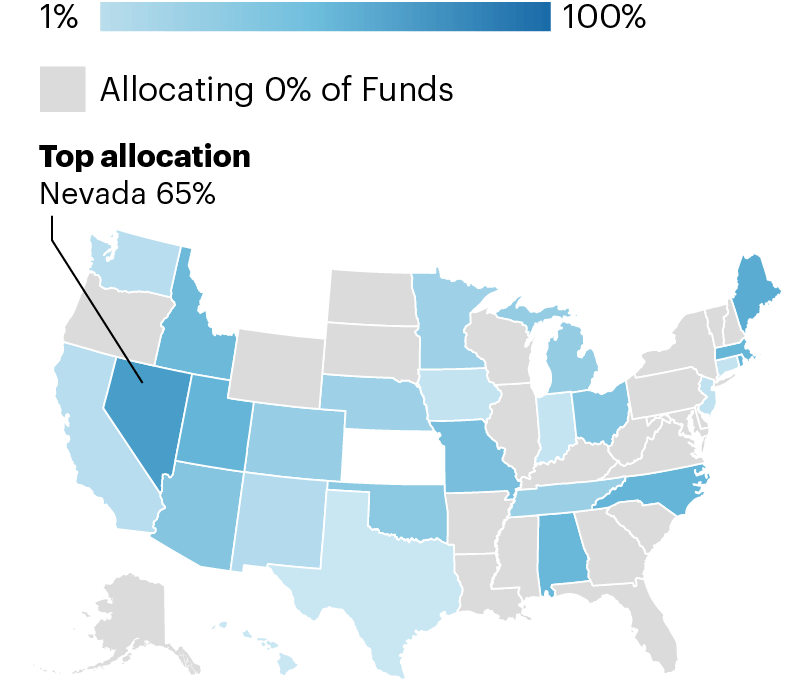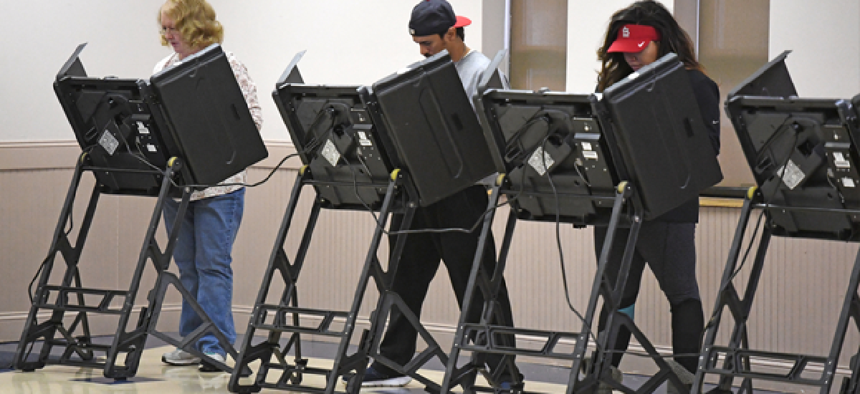Connecting state and local government leaders
The federal government has released data on how states will spend $380 million set aside for election infrastructure. But questions remain about how much it will help secure the 2018 election.
This article first appeared on ProPublica.
The Election Assistance Commission, the government agency charged with distributing federal funds to support elections, released a report Tuesday detailing how each state plans to spend a total of $380 million in grants allocated to improve and secure their election systems.
But even as intelligence officials warn of foreign interference in the midterm election, much of the money is not expected to be spent before Election Day. The EAC expects states to spend their allotted money within two to three years and gives them until 2023 to finish spending it.
Election experts have expressed skepticism that the money will be enough to modernize election equipment and secure it against state-sponsored cyber threats.
“Nationally, $380 million sounds like a huge amount of money, but in the context of what the election officials are needing to defend, replace, oversee and mitigate, it’s really not that much,” said Tammy Patrick, a senior adviser at the Democracy Fund. Federal funds were allocated to states proportionally, based on each one’s voting-age population.
As California Secretary of State Alex Padilla wrote in an opinion piece for The Hill, the $380 million isn’t even new money: “Remember butterfly ballots and hanging chads? The recent federal appropriation was simply the final disbursement of money originally approved in 2003 to address the debacle of the 2000 presidential election in Florida.”
Nearly two-thirds of the funds are expected to go toward new voting equipment and increased cybersecurity protection, with the remainder going toward updating voter registration systems, implementing postelection audits, improving election-related communication efforts and holding the money in reserve.
Two states — Kansas and Montana — received extensions and have yet to submit plans to the federal government.
Here’s how the other states plan to use their portions of federal funds.
States’ top funding priority is cybersecurity

The largest portion of the $380 million will be used to improve election cybersecurity, on items such as training local election officials, purchasing new software, and hiring IT personnel and cybersecurity experts.
Thirty-eight states are allocating funds to cybersecurity. Illinois is one of three — Wisconsin and New York are the others — planning to dedicate all of their allotments to this. In 2016, Russian hackers breached Illinois’ voter registration database and stole the names, emails and partial Social Security numbers of nearly half a million voters.
“We needed to send a strong signal that we were doing everything we could to make sure that nothing like that happened again,” said Matt Dietrich, the public information officer at the Illinois State Board of Elections. Illinois is using part of its $13.2 million share to deploy a “cyber navigator” team to perform on-site risk assessments for local election officials.
Six states allocating all funds to voting equipment

Thirty states plan to use grant money to purchase new voting equipment, replacing voting machines that are often decades old. Six of those states — Alaska, Arkansas, Delaware, Louisiana, North Dakota and Pennsylvania — are expected to use all of their funds to replace voting equipment. The last time a new voting system was purchased in Alaska, for example, was in 1998.
Replacing voting equipment, however, is a costly endeavor that often takes years, and few states will make widespread improvements to their machinery before the midterms. “These machines are not something you can just go to Best Buy and fire up,” said Thomas Hicks, the chairman of the EAC. “It’s going to take time to build that infrastructure.”
Many states will upgrade voter registration systems

In the lead-up to the 2016 election, hackers targeted election systems in 21 states and in a small number of cases successfully penetrated voter registration databases. Twenty-six states plan to use grant money to improve their voter registration systems.
Nevada, which is the state allocating the highest percentage of its funding — 65.4 percent — to voter registration systems, plans to implement multi-factor authentication and require training modules for local election officials. The state also plans to add a full-time position to work on implementing these goals.
North Carolina, which plans to spend a higher dollar amount than any other state, will be improving its voter registration system, dedicating more than $5 million to modernize its decentralized, decades-old statewide election information system by late 2019.
Funding for auditing remains sparse

Twenty-one states plan to use some portion of the federal grant money to perform election audits, accounting for 5.1 percent of the funds. Oregon is spending the highest percentage of its funds — 52 percent — on election audits, according to an estimate from the EAC.
Depending on how elections are run, audits come in a variety of forms.
Connecticut plans to run forensic audits on all of its election vendors. Maryland plans to perform a software audit to validate the election results after the midterm election. Rhode Island plans to deploy a pilot “risk-limiting audit” for the upcoming election.
Election auditing remains an “evolving” field, Patrick said, and many of the states will follow Rhode Island’s lead in piloting audits.
How states, territories and D.C. are allocating their federal funds
|
State |
Voting Equipment |
Election Auditing |
Voter Registration Systems |
Cybersecurity |
Communications |
Reserve / Misc. |
|
AL |
$800,000 |
$3,000,000 |
$2,360,393 |
|||
|
AK |
$3,000,000 |
|||||
|
AS |
$130,000 |
$200,000 |
$50,000 |
$100,000 |
$120,000 |
|
|
AZ |
$2,653,888 |
$4,809,787 |
||||
|
AR |
$4,475,015 |
|||||
|
CA |
$20,000,000 |
$400,000 |
$4,000,000 |
$7,564,000 |
$2,594,874 |
|
|
CO |
$47,474 |
$523,810 |
$1,666,667 |
$2,709,790 |
$966,667 |
$428,571 |
|
CT |
$1,826,000 |
$785,000 |
$295,000 |
$2,139,554 |
$75,000 |
|
|
DE |
$3,000,000 |
|||||
|
DC |
$2,100,000 |
$310,000 |
$450,000 |
$140,000 |
||
|
FL |
$1,500,000 |
$250,000 |
$17,437,003 |
|||
|
GA |
$5,395,247 |
$500,000 |
$4,410,536 |
|||
|
GU |
$253,000 |
$37,000 |
$100,000 |
$110,000 |
$100,000 |
|
|
HI |
$607,080 |
$77,000 |
$1,250,000 |
$1,200,000 |
||
|
ID |
$100,000 |
$538,505 |
$1,550,000 |
$581,391 |
$310,000 |
$150,000 |
|
IL |
$13,232,290 |
|||||
|
IN |
$365,000 |
$6,630,088 |
$600,000 |
|||
|
IA |
$200,000 |
$250,000 |
$2,309,000 |
$1,050,000 |
$799,084 |
|
|
KS |
||||||
|
KY |
$4,600,000 |
$250,000 |
$923,423 |
|||
|
LA |
$5,889,487 |
|||||
|
ME |
$740,979 |
$1,760,000 |
$367,500 |
$262,500 |
||
|
MD |
$105,945 |
$1,120,894 |
$5,307,137 |
$529,723 |
||
|
MA |
$2,000,000 |
$4,000,000 |
$1,890,854 |
|||
|
MI |
$76,990 |
$3,001,554 |
$5,276,567 |
$1,428,469 |
$923,413 |
|
|
MN |
$1,532,342 |
$248,000 |
$4,815,268 |
|||
|
MS |
$4,483,541 |
|||||
|
MO |
$3,000,000 |
$3,000,000 |
$1,230,625 |
|||
|
MT |
||||||
|
NE |
$1,050,000 |
$807,000 |
$725,936 |
$250,000 |
$664,000 |
|
|
NV |
$719,000 |
$2,799,169 |
$220,440 |
$300,000 |
$239,114 |
|
|
NH |
$3,102,253 |
|||||
|
NJ |
$2,500,000 |
$250,000 |
$757,450 |
$3,000,000 |
$250,000 |
$3,000,000 |
|
NM |
$750,000 |
$500,000 |
$2,049,470 |
$400,000 |
||
|
NY |
$19,483,647 |
|||||
|
NC |
$1,073,835 |
$5,340,338 |
$3,959,064 |
|||
|
ND |
$3,000,000 |
|||||
|
OH |
$2,100,000 |
$4,400,000 |
$5,686,021 |
|||
|
OK |
$2,500,000 |
$1,705,818 |
$990,199 |
|||
|
OR |
$2,828,321 |
$422,132 |
$2,112,528 |
|||
|
PA |
$13,476,156 |
|||||
|
PR |
$2,997,966 |
$588,996 |
$90,000 |
|||
|
RI |
$239,770 |
$391,230 |
$1,550,000 |
$734,000 |
$85,000 |
|
|
SC |
$5,515,794 |
$525,000 |
||||
|
SD |
$2,500,000 |
$500,000 |
||||
|
TN |
$4,124,900 |
$1,900,000 |
$1,540,518 |
|||
|
TX |
$475,000 |
$4,750,000 |
$475,000 |
$11,400,000 |
$6,152,604 |
|
|
VI |
$300,000 |
$40,000 |
$45,000 |
$135,000 |
$80,000 |
|
|
UT |
$1,394,447 |
$16,605 |
$2,100,000 |
$600,000 |
||
|
VT |
$2,570,000 |
$120,000 |
$310,000 |
|||
|
VA |
$662,200 |
$5,458,893 |
$225,920 |
$2,733,718 |
||
|
WA |
$897,744 |
$897,744 |
$5,014,536 |
$1,097,744 |
||
|
WV |
$3,000,000 |
$611,943 |
||||
|
WI |
$6,978,318 |
|||||
|
WY |
$2,700,000 |
$300,000 |



